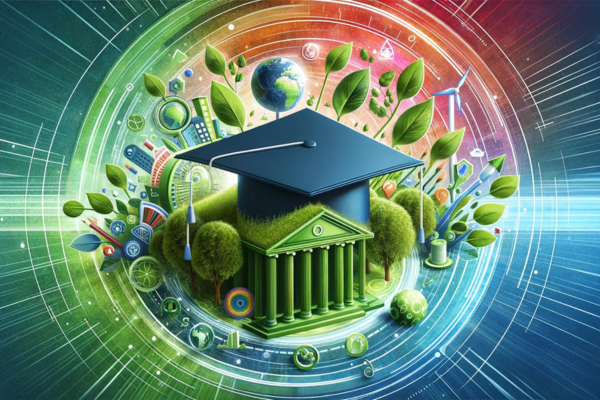
Sustainability, a concept vital to our collective future, has become a pressing priority in higher education institutions (HEIs). As society grapples with challenges like climate change, inequality and the need for sustainable development, HEIs are increasingly recognized not just as centers for learning, but as pivotal change-makers. They hold the power to influence future leaders, innovators and policymakers, shaping the minds that will determine the trajectory of our planet and society.
UNF’s Commitment to Sustainability: Aligning with Global Goals
University of Niagara Falls Canada (UNF) joined more than 360 other post-secondary institutions across the globe by committing to sustainability and taking a stance on higher education’s role in sustainable development. By adopting the United Nations Sustainable Development Goals Accord (SDG Accord), UNF has strategically integrated sustainability throughout its curriculum, research and community initiatives. This move shows a profound shift in the role of educational institutions, positioning them as key players in the global effort to address environmental, social and economic challenges.
Cyndi McLeod, CEO of GUS Canada, articulated this commitment by saying, “As educators, we recognize our responsibility to play a pivotal role in attaining the SDGs by 2030. UNF is demonstrating its commitment by signing the SDG Accord, joining other institutions to work toward building a more sustainable world and create a more equitable future for all.” This showcases the university’s drive to not just educate but actively partake in crafting both a sustainable and equitable future, reflecting a deeper understanding of the HEIs play in global sustainability efforts.
The Broad Impact of HEIs on Sustainable Development
HEIs like UNF are not confined to the boundaries of their campuses when it comes to their influence on sustainability. As highlighted in the International Journal of Sustainability in Higher Education, their impact touches various areas of society, the environment and the economy. HEIs are instrumental in shaping sustainable practices and ideologies, extending their influence far beyond academic pursuits. They mould future leaders, conduct pivotal research and engage with communities, contributing significantly to the broader sustainable development agenda.
Exploring six key impact areas of HEIs, explaining their role in promoting sustainability. From curriculum development to community outreach, these institutions all play a role in advancing sustainable practices demonstrating a profound responsibility in growing a society geared towards sustainability:
- Educational Influence
HEIs shape future generations, embedding sustainability into curricula and creating a culture of environmental and social awareness among students. - Research and Innovation
They are hubs for ground-breaking research, contributing to sustainable solutions in fields ranging from energy to social policy. - Community Engagement
HEIs play a role in community development, engaging in local initiatives and projects that promote sustainability. - Policy Influence
By advising governments and organizations, these institutions help shape policies that support sustainable practices. - Environmental Stewardship
HEIs often lead by example in implementing green campus initiatives and reducing their own carbon footprint. - Economic Impact
Through sustainable practices, HEIs contribute to a more resilient and environmentally friendly economy, often encouraging entrepreneurship in sustainability-focused sectors.
Creating Sustainability Practices: A Framework for HEIs
To effectively embed sustainability in higher education, institutions must focus on creating specific practices. According to research from MDPI’s Education Sciences, there’s a need for a robust framework that equips institutions not only with academic knowledge but with the skills to tackle sustainability challenges in the real world. This framework involves:
- Curriculum Integration
Incorporating sustainability concepts across all disciplines, ensuring a holistic understanding. - Pedagogical Innovation
Employing teaching methods that encourage critical thinking, problem-solving and real-world application of sustainability principles. - Authentic Assessment
Moving beyond traditional exams to assess students’ ability to apply sustainability knowledge in practical settings. - Collaborative Projects
Facilitating student involvement in sustainability projects creates teamwork and community engagement.
These steps aim to align institutions’ programs with broader sustainability goals, preparing graduates who are academically proficient and capable of making meaningful contributions to sustainable development.
University Canada West’s Sustainability Journey
The sustainability journey of University Canada West (UCW), offers an example of HEIs commitment to environmental responsibility. UCW has taken steps towards integrating sustainable practices into its daily operations and academic framework. This includes implementing eco-friendly measures across the campus to reduce waste and enhance energy efficiency, a critical step towards minimizing the university’s environmental footprint.
UCW has also developed academic programs that deeply embed sustainability concepts, ensuring that students graduate with not only a rich academic background but also a keen awareness of sustainability issues. This educational approach prepares them to contribute meaningfully to a sustainable future.
Creating a campus culture that values sustainability encourages staff and students alike to adopt sustainable lifestyles, further amplifying the institution’s impact on promoting environmental stewardship.
Navigating Challenges and Seizing Opportunities in Sustainable Education
Integrating sustainability into higher education is a journey with challenges, yet it is also filled with opportunities. HEIs often confront logistical constraints, such as the need for significant curriculum redesign and the allocation of resources toward sustainable practices. These challenges require not just financial investment but also a cultural shift within the institution, demanding commitment from all stakeholders.
Despite these hurdles, there are immense opportunities for HEIs to emerge as leaders in sustainability. They can leverage their unique position as educational leaders and research hubs to influence both local and global sustainability practices. This includes driving innovation in sustainable technologies, shaping future leaders who are sustainability-conscious and engaging in partnerships that promote sustainable development.
The potential for HEIs to make a significant impact is clear. By overcoming challenges and embracing opportunities, these institutions can influence not only the field of education but also contribute to societal shifts toward sustainable practices.

